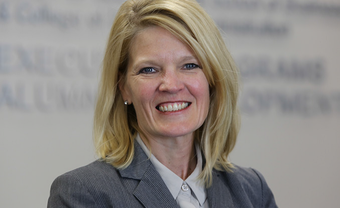
On the first day of school, children are full of questions like “Where do I go?” or “Will my classmates like me?” In that sense, they’re no different than their parents starting an executive MBA program.
It isn’t easy returning to campus as an adult learner. Most executive MBAs have been away from school for a decade or more. After sizing up their classmates or reading that first case, some will question whether they belong. Often, business school seems like just one more responsibility. At work, they face relentless demands and deadlines that sap their sanity. At home, they act as cook, chauffeur, cheerleader, peacekeeper, counselor, and housekeeper. Come evening or weekend, they’re expected to perform at the same level as a twentysomething full-time MBA.

University of Pittsburgh’s Cynthia O’Malley
For the University of Pittsburgh’s Cynthia O’Malley, the married mother of two children and vice president of a corrosion protection firm, the time commitment wasn’t the biggest hurdle in her EMBA program. Instead, it was meeting the expectations of the stakeholders in her life. “The hardest part was maintaining the intense level of focus necessary for sustaining the expansive growth at my organization, while maintaining the similar focus that was necessary for studies, and also fulfilling the responsibilities and meeting my commitments to family and industry.”
In another month, the next wave of EMBA students will be flocking to business schools. They’re whip-smart, inventive, tested, and ambitious. Chances are, though, they’re not fully aware of just how all-consuming business school can be. That’s why Poets&Quants surveyed the members of the Best & Brightest EMBAs of the Class of 2016 to learn the biggest difficulties these newcomers would face as students.
A SYMPOSIUM ON TIME MANAGEMENT

SMU’s Brian Scott Cossiboom
Not surprisingly, time management topped the list. Ask any incoming EMBA student about their strengths and they’ll rattle off tales of 70-hour work weeks and projects that’d make a six-sigma black belt tremble. But the EMBA takes juggling to a new level, says the University of Chicago’s Sarah McEneaney, a Deloitte partner who commuted to Booth from Boston. “One of the Booth admissions officers told me early on, ‘However great you think you are at time management, you’ll get better. WAY better. Trust me.’ He was right! It was a skill I thought I had, but now I am Level 11.
“Being disciplined and getting everything done on time, often just under the wire, from assignments to boarding planes — that should be on my transcript!”
Some EMBAs struggled with the shift into academic mode in the first semester, requiring them to shut down their email or turn off the television to focus on reading cases and completing exercises. IMD’s Zhanna Kryuchkova grew increasingly fatigued by the demands, joking that she “started to search Google for advice like, ‘How to Function on Less Than 6 Hours of Sleep.’” The demands also forced students to continuously make adjustments, adds Southern Methodist University’s Brian Scott Cossiboom, vice president of operations for the George W. Bush Foundation. “Balancing the EMBA program with existing personal and professional responsibilities is more art than science. It was a constant game of changing priorities, and I don’t think there is a perfect answer.”
Major Patrick Henson, who worked at the U.S. Army Maneuver Center of Excellence during his time at Emory University, eased his transition by compartmentalizing his time. “When I was at work, I gave my job and supervisor my complete attention,” Henson says. “The same goes for my classmates and study time. When it came time for homework or a group call, I had a set amount of time that I was ‘all in’ and gave that specific case my full attention.” Despite the usual rocky starts, Henson adds, most classmates quickly adjusted. “After a couple weeks, most students found a rhythm and were able to schedule time for homework around their already busy lives.”





Questions about this article? Email us or leave a comment below.